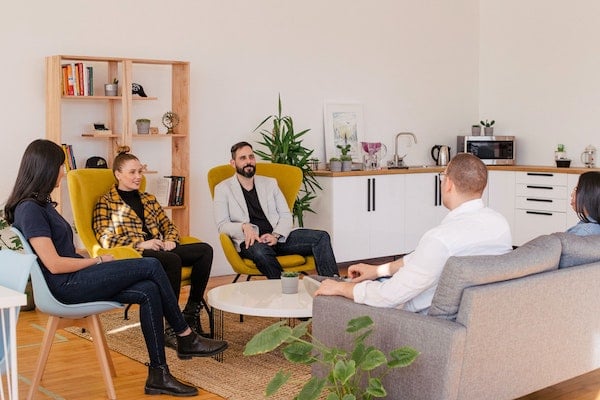Published on
Building a Faculty Learning Community: An Impact Story on Professional Practice

Why focusing on teaching is important
Most universities struggle to engage their faculty in professional practice development and to align professional development to university efforts and needs. More importantly, establishing a space for faculty to share expertise in teaching effectiveness and faculty development is needed to encourage, retain, and improve teaching faculty. Teaching effectively is a learned skill and continues to develop over the course of a faculty member’s career. Catalyzing that development requires high-level and high-quality development resources specific to both teaching itself and to the faculty-member’s individual discipline(s). Discipline development is often overlooked by university administrators who tend to design teaching development programs that focus exclusively on teaching itself and overlook expertise gain and improved knowledge base.
University-provided learning resources and training developed by university centers for teaching excellence or similar teams are valuable to a limited extent in differentiated professional practice. Sharing expertise peer-to-peer and acknowledging the shared expertise of the aggregate teaching faculty in conjunction with university developed training is more effective in developing a professional faculty culture in teaching excellence than administratively provided/created resources.
Leaders must actively promote and cultivate a culture of learning by first acknowledging the expertise of the faculty community. A true learning culture goes beyond programs, courses, or practices. Learning culture requires leaders and managers to actively support professional practice and ongoing learning needs that are identified, prioritized, and cultivated from within. Sharing best practices and learning from one another is a powerful way to show your faculty that you believe in them, trust them, and recognize that they themselves represent expertise and resources that can and should be shared.
Recognizing the professional practice gap in our culture
When I joined Western Governors University, I immediately recognized that we lacked an established space for sharing faculty-driven, professional practice. The university had an abundance of trainings, modules, workshops, and webinars that were developed and curated by leadership but very little in the way of a university-wide connection to our collective professional community. Spaces to continue development conversations and reflections after workshops were created only sporadically and in pockets, but even the most ambitious attendees would typically falter, wane, and end their collaboration within a few months. Faculty tried to maintain connections across common topics that were specifically offered but not necessarily in their expertise or common interest areas. Faculty often struggle to connect with each other outside of their immediate network of colleagues. The faculty needed a place to come together, find each other, and build a unified, cohesive professional community.
In acknowledging the expertise, creativity, and innovation potentials across the university, I worked to determine how to bring people together to form such a collaborative space. Simply, I worked to connect people to people, people to resources, and people to opportunities for learning and sharing to start building community in professional practice. Faculty voice is crucial to building a healthy institutional culture, which includes the shared values, beliefs, written and unwritten rules, assumptions, and behavior of stakeholders within the institutional community that shapes the institution’s social norms and creates opportunities for everyone to succeed. When leaders recognize and allow for the importance of peer-to-peer discussions and self-development, new opportunities arise. An engaged faculty community cultivates creative ideas and innovations. Faculty feel ownership of their professional expertise, development, and sense of belonging. There is a sense of shared responsibility for the collective success of the organization because the faculty have discovered ownership and connections in the work being done. Truth, trust, accountability, and ownership become part of the culture of the collective faculty.
What is an FLC and why start one?
A faculty learning community (FLC) is a specifically structured, peer-led learning community of faculty and staff in higher education that aims to build community, engage in scholarly practice, and develop the scholarship of teaching and learning.
A FLC adds to the driving force in professional practice learning and sharing. The FLC does not remove the existing roles for administrators and professional-trainers from faculty development but creates an added practice-specific quality layer to the existing development of organization-wide strategy and coordination of continuous learning. In the case of professional training with regards to the science of teaching and learning, faculty share their expertise and resources in delivering content but not in curating it. The FLC is a platform for coming together, sharing knowledge, and learning from one another. From creating social spaces for innovative and creative spontaneity, to sparking new opportunities for interdisciplinary research, the FLC provides a crucial gathering place for commonality in professional practice. Faculty determine their most pressing needs, interests, and opportunities, and they develop opportunities to connect, share, and grow. The FLC creates space for a collective voice, community, and professional culture determined and developed by faculty. The FLC acknowledges and recognizes faculty as professional experts and challenges each member to engage in their profession and practice it fully.
From presenting, to publishing, to making connections over common professional interests, the purpose of the FLC is to develop and cultivate opportunities for faculty to engage with faculty in practice. To do this, the FLC builds a framework to share opportunities. There is a space to gather socially, ask questions, and post articles and resources. The FLC also builds partnerships across departments and with key leadership roles throughout the university. Doorways are opened for faculty to engage with departmental efforts and opportunities and for departments to engage and build connections with faculty. There is a pathway for the self-curation of faculty ideas that can ultimately feed into the university’s external engagement efforts, allowing for a forum whereby the leaders of high-level university initiatives can communicate and collaborate with faculty—and possibly add faculty voice and expertise to the conversation. Faculty can learn more openly and frequently about opportunities that exist, trainings and resources that have been developed, and ways to be part of those developments in the future. There is a converging of university-driven initiatives in faculty training with a self-built, self-driven, self-motivated, and expert-level professional practice community.
Providing faculty with a peer-developed and facilitated platform combined with a community space that supports innovation, instructional and practice processes, development, and sharing of practices across the university, fully promotes and supports faculty taking responsibility for their professional development and teaching excellence. The FLC is truly for faculty and by faculty. The excitement and palpable energy in the space is invigorating. Faculty will continue to step in to create, build, contribute, and learn. We come together in professional engagement to connect in our practices and further develop professionally. The community space is where we act as both educators and students, and in which we should feel compelled to engage and grow.
Disclaimer: Embedded links in articles don’t represent author endorsement, but aim to provide readers with additional context and service.
Author Perspective: Administrator



